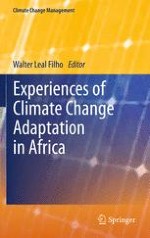2011 | OriginalPaper | Buchkapitel
12. A Swot Analysis of Mitigation of Climate Change Through REDD
verfasst von : Emmanuel F. Nzunda, Tumaini G. Mahuve
Erschienen in: Experiences of Climate Change Adaptation in Africa
Verlag: Springer Berlin Heidelberg
Aktivieren Sie unsere intelligente Suche, um passende Fachinhalte oder Patente zu finden.
Wählen Sie Textabschnitte aus um mit Künstlicher Intelligenz passenden Patente zu finden. powered by
Markieren Sie Textabschnitte, um KI-gestützt weitere passende Inhalte zu finden. powered by
